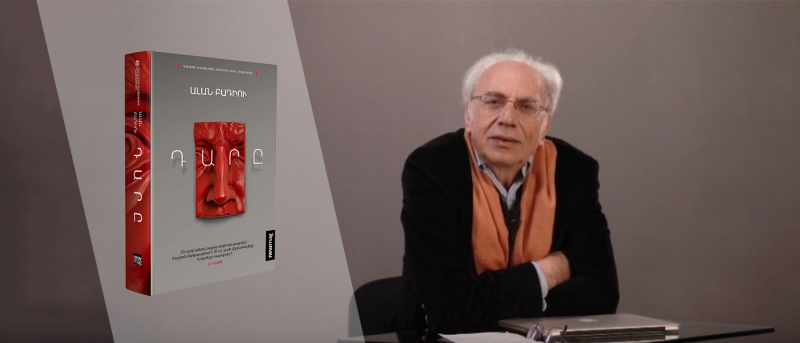Mark Nshanian: Badiou created his own political ideology and became one of the most influential philosophers of his time (video in Armenian)

Alain Badiou compiled all the achievements, losses, wars and anxieties, defeats and inventions of the 20th century in one book. He analyzed all of these in a philosophical perspective. The most influential French philosopher of our days thoroughly present
Mark Nshanian believes that one of the most important characteristics of Alain Badiou is the fact that he was Louis Pierre Althusser’s student. At the same time, Badiou managed to invent his own political direction and became one of the most influential philosophers of his time. “He was Althusser’s student. In the meantime, Badiou was really affected by the psychoanalyst Jacques Lacan’s ideologies. You can feel the influence of Lacan’s vocabulary and ideologies in Badiou’s philosophy.”
Badiou is a Marxist philosopher. After the collapse of the Soviet Union it was a challenging period for Marxist ideology, because people could see how the embodiment of that ideology collapsed in front of their eyes. “We could see how the 20th century collapsed in front of our eyes. There was an immediate need to reevaluate the political and philosophical directors that were somehow connected with Marxism. This statement is also true in the case of Badiou’s ideology.”
Mark Nshanian points out that there was even a period when Badiou was a keen follower of Maoism. Maoism is a variety of Marxism–Leninism that Mao Zedong developed for realising a socialist revolution in the agricultural, pre-industrial society of the Republic of China and later the People's Republic of China.“Indeed, he was Maoist and, in this book, as well Badiou cites Mao Zedong without any criticism. He talks about Maoism in a positive light, which was a bit strange to me.”
Mark Nshanian believes that one of the most important features of the book is that it puts a special emphasis on art and its influence. Moreover, Nshanian believes that the last section of the book is the most important one. He even suggests that the readers start reading the book from the end. The editor of the book considers Badiou’s language to be quite complex and difficult to understand. In fact, he claims that his language is more difficult than that of other philosophers. Besides, the book is based on Badiou’s lectures, which makes the language more conversational.
“Recently, I have translated several philosophical books in Armenian. It wasn’t a hard thing to do, because Armenian is a good language for philosophy translations. However, I came up with some difficulties in the case of Badiou’s book. Firstly, because he used psychoanalytic language. Secondly, because he used the conversational language of his lectures.”
Mark Nshanian claims that it was possible to overcome the language difficulties in cooperation with the book translator. They used the rich backgrounds of both Eastern and Western Armenians and were able to successfully translate all the complex philosophical terms into Armenian.
Read also

At Winterfest 2026, Newmag will present Henrikh Mkhitaryan’s memoir “My Life Always at the Center” (trailer)

Winterfest to feature David Georgyan’s sci-fi action novel Impedance (trailer)

At Winterfest 2026, Newmag will present Marianna Hakobyan’s “Don’t Change the Names” (trailer)

Closing and Award Ceremony of the “Sprout in Armenian – 2025” Competition at Newmag Winterfest

